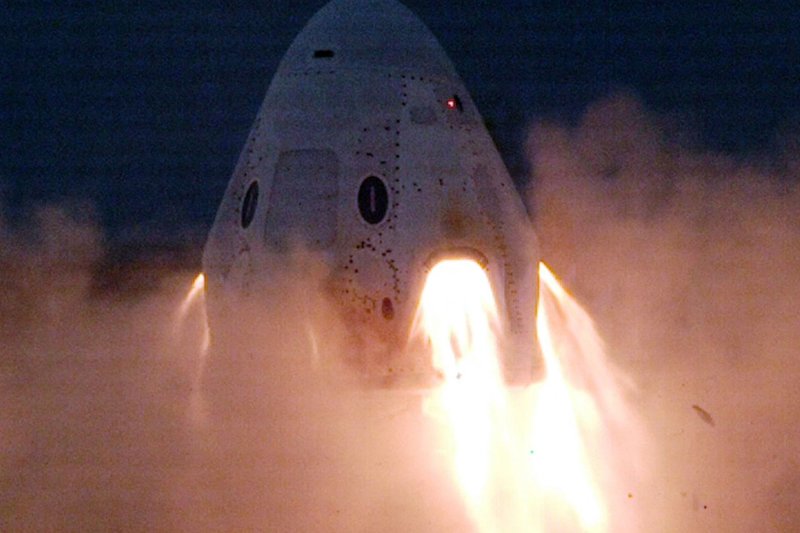SpaceX completed a series of static fire engine tests of the Crew Dragon spacecraft on Wednesday, just before to new report that criticized delays in the space program. Photo courtesy of SpaceX |
License Photo
ORLANDO, Fla., Nov. 15 (UPI) -- A government report on NASA's quest to send people into space again criticizes the agency for making additional and "unnecessary" payments to Boeing Co. of up to $287 million.
The report from NASA's Office of Inspector General, an independent watchdog, also says NASA made those payments to Boeing without talking to the other major contractor on the program, SpaceX, about alternatives.
And the report, released Thursday, says delays and overruns in the Commercial Crew Program to send astronauts to the International Space Station continue to jeopardize that program.
Despite both contractors' assurances they are getting close to crewed launches, astronauts most likely won't ride in Boeing's Starliner capsule and SpaceX's Crew Dragon "at least until summer 2020," the report said.
Boeing, SpaceX and NASA declined to comment about the findings, but all three companies issued statements in writing. Boeing and NASA pushed back against the criticism, while SpaceX steered clear of the findings.
Boeing has scheduled an orbital flight test of a Starliner capsule for Dec. 17, while SpaceX recently completed a new test firing of its Crew Dragon.
The arrangement with Boeing protected the original idea of the ISS crewed launch program having two competing private contractors, according to a written response from Ken Bowersox, NASA's acting associate administrator for human exploration and operations.
The additional payments represent "the value to NASA and to the nation of having two independent U.S. space transportation systems," Bowersox wrote.
NASA also said in a statement that the additional Boeing payments were approved because the company offered the agency new flexibility in its schedule.
"It would have been inconsistent with federal procurement practices to ask SpaceX to propose the same solution. In addition, SpaceX's original lead time was sufficient to meet NASA's requirements and therefore there was no value to NASA to request an acceleration of SpaceX's production schedule," the NASA statement said.
The report said that NASA, in 2016, identified growing potential for a gap in U.S. ability to deliver astronauts to the space station. According to the report NASA approached Boeing and not SpaceX, and eventually agreed to pay Boeing more to address delays.
"SpaceX was not notified of this change in requirements and was not provided an opportunity to propose similar capabilities that could have resulted in less cost or broader mission flexibilities," the report said.
Despite the allegation, Boeing said negotiations were "fair and open."
"Boeing is taking significantly more up-front financial risk, and is already helping NASA with critical decisions key to optimizing future ISS operations," the company said in a statement. "Boeing is also now holding all of the up-front mission costs, which NASA will not have to pay until after each mission is officially ordered and given authority to proceed."
Boeing and SpaceX were awarded contracts to pursue crewed launches to the space station in 2014. In 2019, those contracts are valued at $4.3 billion and $2.5 billion, respectively.
"Assuming four astronauts per flight and using publicly available information, the estimated average cost per seat is approximately $90 million for Boeing and approximately $55 million for SpaceX," the inspector general's report said. SpaceX, however, has said it could carry up to seven astronauts at a time.
SpaceX said in a statement: "We look forward to safely flying NASA astronauts to and from the International Space Station starting early next year."
Bowersox also pushed back against a finding in the report that delays have added to "risk of system failure" by pointing out that neither the inspector general nor NASA's Aerospace Safety Advisory Panel have found evidence that concerns about schedules have jeopardized safety.















